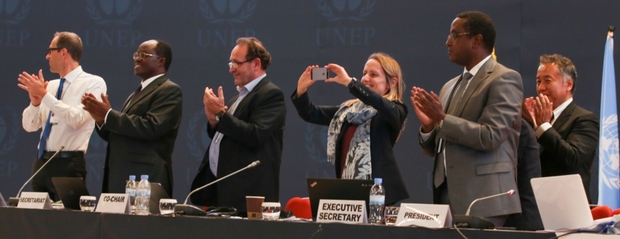Montreal Protocol marks a milestone with first ratification of Kigali Amendment

- Countries that ratify the Kigali Amendment commit to cut the production and consumption of powerful greenhouse gases hydrofluorocarbons by more than 80 percent over the next 30 years
- Reducing hydrofluorocarbons under the Kigali Amendment is expected to avoid up to 0.5° Celsius warming by the end of the century, while continuing to protect the ozone layer
- All prior amendments and adjustments of the Montreal Protocol, which marks its 30th anniversary this year, have universal support
Global efforts to protect the climate and the ozone layer have received a boost with the first ratification of the Kigali Amendment to the Montreal Protocol on Substances that Deplete the Ozone Layer. The ratification by Mali was received on 31 March. More countries are expected to ratify this Amendment in the coming months.
The Amendment was adopted in October 2016 to phase down powerful greenhouse gases hydrofluorocarbons (HFCs), which are frequently used as substitutes for ozone-depleting substances (ODSs). HFCs are climate-warming gases that have significant global warming potentials.
“We congratulate Mali for officially becoming the first party to ratify the Kigali Amendment. We urge more countries to follow suit in order to protect our climate,” said Erik Solheim, Head of UN Environment.”
The Kigali Amendment will enter into force on 1 January 2019, provided that it is ratified by at least 20 parties to the Montreal Protocol.
Reducing HFCs by more than 80 percent
Countries that ratify the Kigali Amendment commit to cut the production and consumption of HFCs by more than 80 percent over the next 30 years. Most developed countries will start reducing HFCs as early as 2019. It is expected that this will avoid up to 0.5° Celsius warming by the end of the century, while continuing to protect the ozone layer.
The Kigali Amendment is the fifth in a series of amendments to the Montreal Protocol. All prior amendments and adjustments of the Montreal Protocol, which marks its 30th anniversary this year, have universal support.
“We warmly congratulate Mali for ratifying the Kigali Amendment. This is a significant milestone in the protection of the climate and the ozone layer. We stand ready to support all parties to the Montreal Protocol as they undertake the important step of ratification and to work with them in the eventual implementation of the Amendment for the protection of our environment,” said Tina Birmpili, Executive Secretary of the Ozone Secretariat.
Through the Kigali Amendment, the Montreal Protocol takes responsibility for HFCs and plays a leading role in working towards an environmentally sustainable world where no one is left behind, consistent with the 2030 Agenda for Sustainable Development.
Successful environmental agreement
The Protocol is a well-established multilateral environmental agreement that is successfully preventing massive damage to human health and the environment from excessive ultraviolet radiation from the sun by phasing out the production and consumption of substances that deplete the ozone layer.
Under the Protocol, the nations of the world have phased out nearly 99 per cent of close to 100 ozone-depleting substances and prevented adverse impacts on agriculture, animals, forests, marine life, natural ecosystems and materials. In addition, up to 2 million cases of skin cancer may be prevented each year by 2030.
As a result of the unwavering commitment of the parties to the Protocol, the ozone layer is on track to recovery by mid-century.
The Protocol is also one of the prime contributors to the fight against climate change, as it has averted more than 135 billion tonnes of carbon dioxide equivalent emissions.
The Multilateral Fund for the Implementation of the Montreal Protocol, a financial mechanism of the Protocol, has provided over US$3.5 billion to developing countries to phase out ozone-depleting substances.
Developing countries that are parties to the Kigali Amendment will have access to financial and technical support provided under the Protocol.
